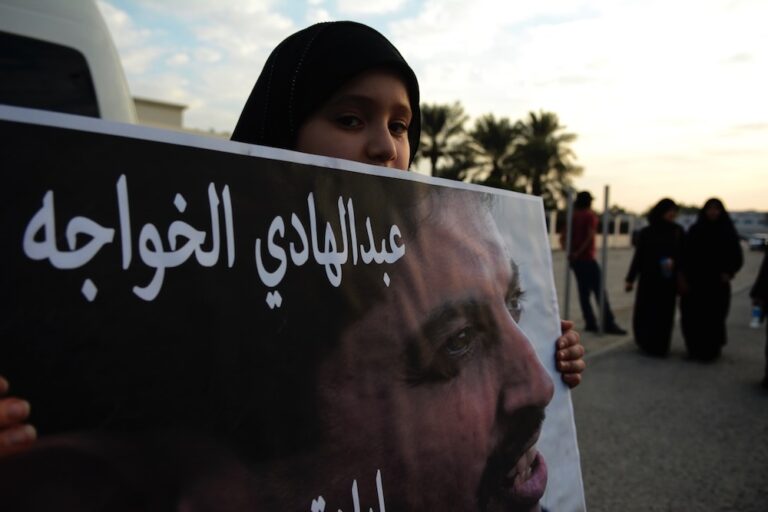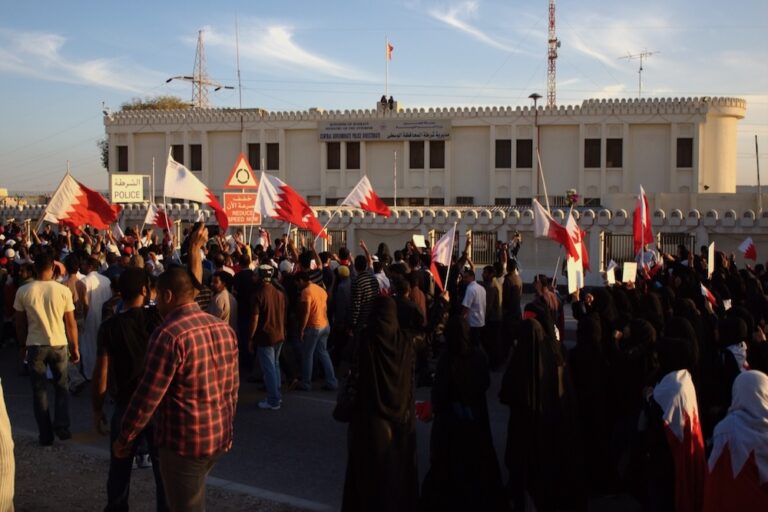Bahraini activist Redha Abdullah Al-Ghasra, 25, was arrested on 24 May 2013. He has since gone missing prompting a slew of social media activity regarding his arrest and disappearance.
The Bahrain Center for Human Rights (BCHR) expresses its grave concern over the Bahraini authorities’ continued targeting of activists who demand freedom and change, and the prevalence of forced disappearances among those who get arrested.
On 24 May 2013, security forces arrested Redha Abdullah Isa Al-Ghasra (25 years old), an activist wanted by the authorities. Al-Ghasra had, until then, managed to successfuly remain in hiding as he was being targeted by two particular officers of the security forces, Yousif Al-Mannaie and Ebrahim Habib Al-Ghaith, both of whom have reportedly made several death threats against Al-Ghasra and his family, according to the family’s testimonies. By the time this report was published, no official information had been received regarding Al-Ghasra’s arrest.
Details of the incident began circulating when activists and tweeps broadcast, on their twitter accounts, a sound recording of someone moaning in pain. They claim that the voice in the recording belonged to Al-Ghasra who was being beaten and tortured by security forces on the street in Bahrain.
Government loyalists broadcast photographs of Al-Ghasra, handcuffed and lying on the ground as blood flowed down his face.
One individual affiliated with the Bahraini regime posted two photos side by side, one of Al-Ghasra and another of a gun, claiming that security forces found a gun with him during his arrest.
In a public statement, Al-Ghasra’s family mentioned that he had an accident when he was very young causing his right hand’s three fingers (ring, middle and index) to be amputated. The family denied that he would be able to skillfully carry a gun with his left hand.
Eye witnesses stated that at 7:30 am on 24 May 2013, civilian cars surrounded Al-Ghasra, who was riding his motorcycle, arrested him in a brutal manner and took him to one of the unofficial torture centers, known as the ‘cavalry’.
Al-Ghasra’s family stated that they have been intensely targeted by government forces over the last two years– their home was reportedly subjected to 70 house raids between March 2011 and May 2013.
The last of these house raids was on 11 May 2013. The area of Bani Jamra, west of Manama, where Al-Ghasra’s residence is located, was surrounded from 9:00 pm until 2:00 am.
The Ministry of Interior announced on Twitter that ‘while a security patrol was carrying out its duties in Bani Jamra, its members heard gunfire from an automatic firearm, and that investigations are under way’. Al-Ghasra was arrested in May 2011, and was released in August of the same year. He faces charges that could put him in prison for up to 41 years in various cases in which the Public Prosecution alleges that he assembled and detonated a bomb; he is now awaiting a verdict.
Since his arrest in April 2012, the government’s targeting of Al-Ghasra reportedly took a more serious turn when him and his friend – Aqeel Abdul-Mohsen – were shot at from a close distance injuring Al-Ghasra’s shoulder and Abdul-Mohsen’s face.
On 29 May 2013, a court will look into one of the cases of illegal assembly brought against Al-Ghasra, it is not known, however, whether he will be appearing in the courtroom given his state of forced disappearance.
Al-Ghasra is not the only one targeted in his family. His brother Yasser (23 years old) has been detained and sentenced to 37 years in prison in four different cases; some cases are still pending against him.
Although the Ministry of Interior claims that he has escaped from prison, his family states that they have not received any information from him or about him in a long time. Additionally, a younger brother Sadiq (19 years old) was sentenced to 26 years in prison in three different cases, and awaits a verdict in seven others.
Sadiq happens to be one of the prisoners whom Nabeel Rajab, president of BCHR, recently witnessed being tortured in jail. Rajab has since been held in solitary confinement without contact with his family. In their published a statement, Al-Ghasra’s family expressed their concern regarding their son’s fate and held the authorities responsible for his well-being, especially after the Ministry of Interior denied having him in custody.
The three brothers face charges that vary between illegal assembly and claims of participating in detonating bombs and starting fires. These charges come at a time where the elements of a fair trial are absent in Bahrain, the rights of defendants are not guaranteed, the public prosecution’s investigations are regularly based on confessions extracted under torture, and where defendants are often deprived of any contact with their families and lawyers.
Based on the above, BCHR calls on the Bahraini government to:
- Immediately reveal the fate of Redha Al-Ghasra and allow him to contact his family;
- Hold accountable those responsible for kidnaping and torturing Al-Ghasra;
- Immediately put an end to kidnappings and forced disappearances of detainees;
- Immediately stop the torture practices that generally begin at the moment of arrest and continue with the aim of extracting confessions;
- Stop targeting activists and provide them with enough space to express their opinions;
- Stop fabricating cases and charges against activists and stigmatizing communities and individuals as ‘terrorists’.


